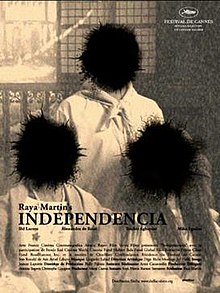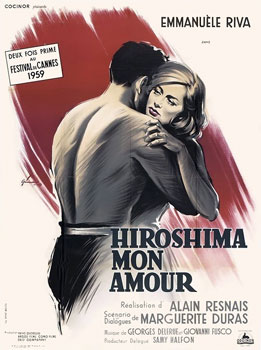
Hiroshima mon amour, is a 1959 romantic drama film directed by French director Alain Resnais and written by French author Marguerite Duras.

Catalino Ortiz Brocka was a Filipino film director. He is widely regarded as one of the most influential and significant filmmakers in the history of Philippine cinema. His filmography often addressed the country's societal issues, and despite his initial closeness with the Marcos family, his work eventually grew to have anti-authoritarian themes in opposition to the Marcos dictatorship.
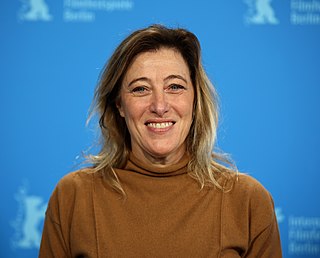
Valeria Carla Federica Bruni Tedeschi, also written Bruni-Tedeschi, is an Italian and French actress, screenwriter and film director. Her 2013 film, A Castle in Italy, was nominated for the Palme d'Or at the 2013 Cannes Film Festival.

Gymkata is a 1985 martial arts film directed by Robert Clouse, based on Dan Tyler Moore's 1957 novel The Terrible Game. It stars Olympic gymnast Kurt Thomas as Jonathan Cabot, an Olympic gymnast who combines his gymnastic ability with martial arts to enter a deadly competition in a fictional country, Parmistan. Supporting cast members includes Tetchie Agbayani as Princess Rubali, alongside Richard Norton, Edward Bell, John Barrett, Conan Lee, Bob Schott and Buck Kartalian.

The Emerald Forest is a 1985 British adventure drama film set in the Brazilian rainforest, directed by John Boorman, written by Rospo Pallenberg, and starring Powers Boothe, Meg Foster, and Charley Boorman with supporting roles by Rui Polanah, Tetchie Agbayani, Dira Paes, Estee Chandler, and Eduardo Conde.

Blissfully Yours is a 2002 Thai romance film written and directed by Apichatpong Weerasethakul. It won the Un Certain Regard prize at the 2002 Cannes Film Festival.
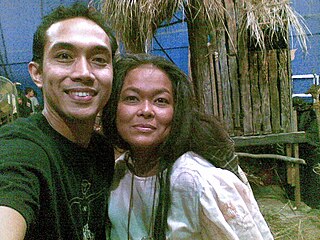
Visitacion Parado, better known by her screen name Tetchie Agbayani, is a Filipino actress, model and psychology instructor. She began her acting career in the film Pepeng Shotgun (1981), following several stints in pageantry and modelling. She was the first and only Filipino woman to appear on the cover of the German edition of Playboy, in 1982. She has starred in numerous Hollywood films such as The Emerald Forest (1985), Gymkata (1985), The Money Pit (1986), Rikky and Pete (1988) and has received accolades at the Metro Manila Film Festival, in addition to nominations for a FAMAS, Gawad Urian, Star Awards for Movies and Luna Awards.
Adolfo Borinaga Alix Jr., also known as Adolf Alix Jr., is a Filipino screenwriter and film director.

I Luv NY is a 2006 Philippine television drama romance series broadcast by GMA Network. The series is the first Philippine television drama series filmed in New York City. It stars Jolina Magdangal, Jennylyn Mercado, Mark Herras and Marvin Agustin. It premiered on May 15, 2006 on the network's Telebabad line up. The series concluded on September 8, 2006 with a total of 85 episodes. It was replaced by Bakekang in its timeslot.
The Cinemanila International Film Festival is an annual film festival held in Manila, Philippines. It was founded by Filipino filmmaker Amable "Tikoy" Aguiluz in 1999. The focus of the festival is on the cinema of the Philippines as well as Southeast Asian cinema.
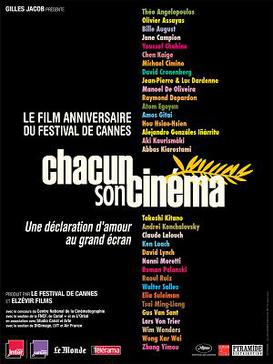
To Each His Own Cinema is a 2007 French comedy-drama anthology film commissioned for the 60th anniversary of the Cannes Film Festival. The film is a collection of 34 short films, each 3 minutes in length, by 36 acclaimed directors. Representing five continents and 25 countries, the filmmakers were invited to express "their state of mind of the moment as inspired by the motion picture theatre".

Ligaw Na Bulaklak is a 2008 Philippine television drama broadcast by ABS-CBN. Based of a 1976 Philippine film Mga Ligaw Na Bulaklak. Directed by Andoy L. Ranay, it stars Roxanne Guinoo, Sid Lucero, Ara Mina, Marc Abaya and Coco Martin. It aired on the network's Hapontastic line up and worldwide on TFC from May 26 to October 24, 2008, replacing Prinsesa ng Banyera and was replaced by Pieta.

Habang May Buhay is a 2010 Philippine television drama medical series broadcast by ABS-CBN. The series is a remake of the 2000–2001 Philippine television authologies series of the same title aired on IBC. Directed by Wenn V. Deramas, it stars Judy Ann Santos, Gladys Reyes, Derek Ramsay, Joem Bascon, Will Devaughn, Rio Locsin, Tetchie Agbayani, John Arcilla, and Gina Alajar. It aired on the network's Primetime Bida line up and worldwide on TFC from February 1 to May 14, 2010 replacing Boys Over Flowers: One More Time. This also marks Santos and Reyes' reunion project in 13 years since they were together in Mara Clara.
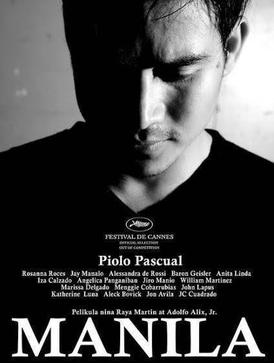
Manila is an independently produced twinbill film that pays homage to Lino Brocka's Jaguar and Ishmael Bernal's Manila By Night. Piolo Pascual co-produced and starred in both episodes.

Revenge is a 1989 Soviet historical drama film directed by Ermek Shinarbaev and written by Anatoli Kim. It was screened in the Un Certain Regard section at the 1991 Cannes Film Festival. The film was restored in 2010 by the World Cinema Foundation at Cineteca di Bologna / L’Immagine Ritrovata Laboratory and released as Revenge.

The Red Shoes is a 2010 Filipino film directed by Raul Jorolan and produced by Unitel. The film uses a non-linear narrative style, using history to frame a tale of lost love and redemption spanning close to three decades, starting in 1981 with the tragic accident in the construction of the Manila Film Center, through to the 1986 People Power Revolution, which ended the 21-year Presidency of Ferdinand Marcos, and finally concluding in 2009, which finds the major characters of the film facing the consequences of the theft of one of 3,000 pairs of shoes of the First Lady Imelda Marcos. The film won the Special Jury Prize in the 2010 Bogota International Film Festival. It participated in the 2010 Vietnam International Film Festival in Hanoi and the 2010 China Golden Rooster and Hundred Flowers Film Festival. The film was rated "A" by the Cinema Evaluation Board of the Philippines and was also cited as Best Picture in the 2010 Catholic Mass Media Awards in the Philippines.

Unofficially Yours is a 2012 Filipino romantic film directed by Cathy Garcia-Molina, starring John Lloyd Cruz and Angel Locsin with Edgar Mortiz, Tetchie Agbayani and Edgar Allan Guzman as Kelvin. It was produced and released by Star Cinema. The film was released domestically on February 15, 2012. It was third highest grossing Filipino film of 2012.

Idrissou Mora-Kpai, is a Beninese-American filmmaker. He is most notable as the director of critically acclaimed films Indochina Traces of a Mother, Arlit The Second Paris, and Si-Gueriki The Queen Mother. He is a recipient of the John Simon Guggenheim Memorial Foundation Fellowship and the Dutch Prince Claus Award
Balweg is a 1987 Filipino biographical action drama film directed by Antonio Perez. Inspired by the life of Catholic priest turned communist rebel Conrado Balweg, it stars Phillip Salvador as the eponymous rebel, alongside Rio Locsin, Tetchie Agbayani, Johnny Delgado, Pinky Amador, Jose Romulo, Mon Godiz, Bebong Osorio, Eddie Infante, and Baldo Marro. Produced by Viva Films, Balweg was released on July 8, 1987, and was a box office success. Phillip Salvador won both the FAMAS Award and the Film Academy of the Philippines Award for Best Actor.

Whether the Weather is Fine or Kun Maupay Man It Panahon is a 2021 drama film directed and co-written by Carlo Francisco Manatad in his feature directorial debut. The film is a disaster movie which combines satirical and surreal elements. Starring Daniel Padilla, Rans Rifol, and Charo Santos-Concio, the film is set against the backdrop of the devastation caused by the 2013 Typhoon Haiyan in the Philippines. The film is a joint production by Black Sheep Productions, Globe Studios, and Dreamscape Entertainment.
